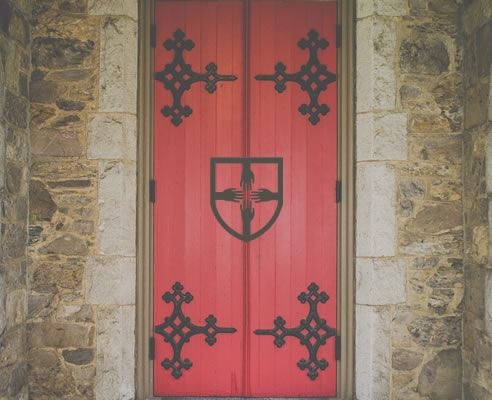I was looking for an AA meeting in Paris. I got to the church early, and watched which door people were going in. Churches can have many doors, and meeting locations can be sort of cryptic, a back door or an obscure staircase from the parking lot.
Finding and following the crowd, we walked down steep stone stairs. AA? I asked. Oui, she said, oui, c’est dans la crypte. The location actually was cryptic, that is hidden, mysterious, the lowest, deepest room of an old stone basilica, the foundation, where we would gather to share our struggles to maintain a foundation of sobriety.
I love church crypts. These deepest rooms are small and dark, with stone arches, musty smell. Sometimes there is an eternal light, or an icon, and an invitation to spend time in prayer. Once in a crypt I found on the altar a roughly scribbled note, and read it: Cher Dieu, dear God, help me in my addiction, help me find new life, forgive my sins, pardonnez vous mes offenses, help me, m’aidez. I picture a desperate young man, alone in the depths, seeking respite from the apocalypse of his life, scribbling that note. How long had it been there?
In Vezelay, in Burgundy, there is an all-night vigil every Thursday night in the crypt, praying before the host, the reserved communion bread. On retreat, I join the monks and nuns in the dark. At 6am Friday the bread is brought up out of the Romanesque depths and placed on the altar in the bright Gothic nave.
In Paris I join another procession, more noisy and scraggly than the solemn monastics, down to the crypt. The room is like a lot of AA meeting places in other churches, a room also used by many other folks. Perhaps it was also the choir rehearsal room, or a church school classroom, various boxes of music stacked by the walls and kids’ pictures taped to the stone.
A nice person offers to get me some coffee through the crowded bustle of chairs and people, and brings me back a cup half full. I feel a blast of grumpiness about their stinginess, it’s early and this is my first cup, until I taste it – delicious French espresso, thick and jolting.
The speaker is a longtime American Paris resident; it is an English speaking meeting. She had moved here originally on a “geographic,” an AA term for dealing with your addiction by moving; “I did a geographic, to get away from trouble, shame, the wreckage of my past.” A desperate or resigned hope that a new place will help one get sober. But mostly these stories are about how the descent only continues, gets worse, in the new place one just gets deeper and deeper into one’s addiction.
It seems appropriate to be in this deep cold dark room, well actually it is pretty well lit by 21st century lights, but one can tell it was originally lit only by candles in the wall alcoves, to be down deep when we are speaking of down deep cold memories. Crypts can be cold, but that jolt of expresso and the happy 40 people in a small room warms me up pretty quickly.
After the meeting I sit for a few minutes to enjoy the room, the afterglow. My sponsor encourages me to do this, not to rush out afterwards, stay for the meeting after the meeting, meet someone. A young woman starts talking with me, we discover we are staying near each other, we talk Paris for a bit. “My parents are driving me crazy.” They are so judgmental, it feels like to her, why does she have to live so far away, why does she have to keep going to meetings if she is now sober? We laugh the knowing laugh of the converted.
Like the sleepy Friday morning exodus from the crypt tomb in Vezelay, we stumble up the steep stone stairs of this church and out into the Paris morning. I see that same woman a day or so later at another meeting across town. We smile and hug like old friends.
I continue my France trip visiting crypts and meetings. In towns where I can’t find a meeting I take my Big Book with me down into the crypt and read. Not by nature a great kneeler or bower, I have to get down closer to the ground to enter these crypts. I pray. And practice beginner’s mind. I touch the cold stone foundational walls. The dirt floor connects my feet to the earth. I stare at the precious host and give thanks for new life.
-Deborah Streeter
 In the early days of the Church, when the front door of the parish was painted red it was said to signify sanctuary – that the ground beyond these doors was holy, and anyone who entered through them was safe from harm.
In the early days of the Church, when the front door of the parish was painted red it was said to signify sanctuary – that the ground beyond these doors was holy, and anyone who entered through them was safe from harm.